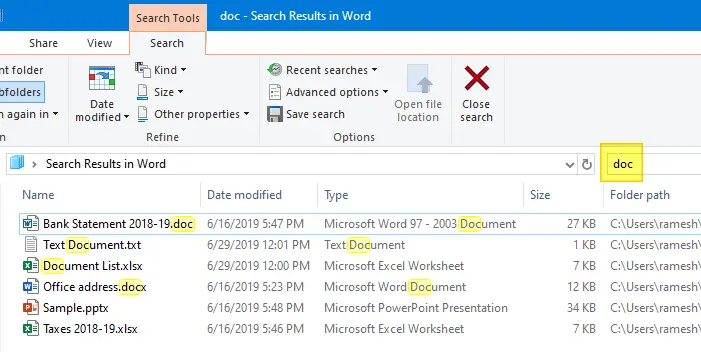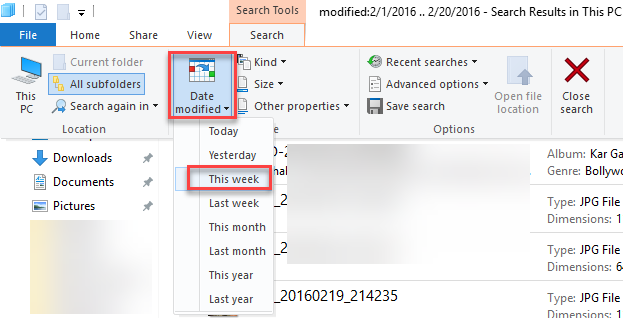

Now we know that we have to add two functions: Usage() and Search_in_File(). If everything went alright the program will return 0. The results are captured to do some basic error-handling in the if statement that follows. The actual work is done in the next statement where we call a second function called Search_in_File that uses our command-line input. The system() function can execute a system specific command.
WINDOWS SEARCH ALL FILES FOR TEXT WINDOWS
With the system(“cls”) function on windows and system(“clear”) function on Unix/Linux we can clear our screen, so we can display the results on a fresh screen. To read more on command-line parsing read the following tutorials: C Tutorial – More on Functions and C Tutorial – Command Line Parameter Parsing. (Note: that the first command-line parameter is the program itself.) We just say if the command-line parameters are smaller or larger than three, display our usage function and exit the program. We also want to make sure that we get a proper usage message, if the command-line options are not inputted correctly. This why we use int main(int argc, char *argv). Prints the line number as well.Īdvanced options include returning content that is found at the beginning or end of lines, using regular expressions, or using wildcards.Result = Search_in_File(argv, argv) īecause we want to write a program that can that can be used over and over, we need to make sure that all the variables we need, such as filename and the search-string, can be inputted at the command-line. findstr /b /n /r /c:"^ *FOR" *.bas- Returns any line that begins with FOR that are preceded by zero or more spaces.It is quite a powerful search command like grep and we can use. Another tool which is grep equivalent in windows is the findstr command.We look for option available with findstr command using help findstr.

findstr /s /i Windows *.* - Searches every file in the current directory and all subdirectories for the word Windows ignoring letter case. The below command searches for string in all the files ending.findstr "windows" c:\documents\*.* - Searches any file under c:\documents for the string "windows".findstr "windows 10" windows txt - Searches for "windows" or "10" in the file.findstr /c:"windows 10" windows.txt - Searches the document windows.txt for the string "windows 10".netstat | findstr "123.123.123.13" - Runs the netstat command and returns any result that matches the string (in this case the IP address).ipconfig | findstr "192.168" - The command runs ipconfig and returns any result that matches 192.168./V - print only lines that contain a matchįindstr Examples That You May Find UsefulĬonsider these examples to try with findstr:./P - skip files with non-printable characters./B - matches patterns at the beginning of lines./R - use search strings as regular expressions./S - searches the directory and all subdirectories.

For example, you can look for exact match or case-sensitive words inside files. Some Useful Parameters in findstrĪs you explore findstr, the following parameters will help you find specific texts. You can also search the file by mentioning its size and creation date that is allowing you to get the specific results easily. Alternatively, use the Run command to open findstr. Search files by their name, text, and Unicode string as well as with regular expression using MultiFind. This commit does not belong to any branch on this repository, and may belong to a fork outside of the repository. Open a new command line prompt by clicking on the Windows-key, typing cmd.exe, and selecting the result. Windows-Activator/windows activation.txt. You can run findstr from the command line or as a batch file. You may use it to scan entire directory structures or drives for files that match the selected string or part of it, and to find specific text in command line outputs quickly. What is findstr – Search for Text in Windows Files Example of findstr on Windows CMDįindstr is a powerful command that you may use to search for strings in files or to filter command line output. Third-party tools like Notepad++, GGRep, and Everything support finding text in files as well. Run findstr /? from the command line to display all parameters and options that "Find String" supports. You can use the application to filter command-line outputs and search individual files or entire directory structures for files with matching text. It is available in all major Windows versions including Windows 10.
WINDOWS SEARCH ALL FILES FOR TEXT FREE
In other words, if you want to find specific exact match text strings in files, in a command-line output, or elsewhere, you may use the free findstr command on Windows to do so. Findstr is a built-in tool of the Windows operating system that you may run from the command line to find text in files or in command-line outputs.


 0 kommentar(er)
0 kommentar(er)
